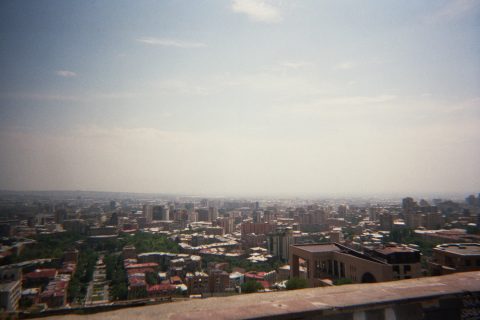My dream of seeing the magic mountain has turned into a saga worthy of The Magic Mountain (Thomas Mann, 1924).
Having walked across town, taken several escalators up the Cascade — a unique Soviet architectural structure housing various viewpoints as well as multiple galleries that was completed in 1980 — and walked up to the very top of the hill, braving 30-degree heat and some guy trying to sell me something in Russian in the process, my view was obscured by low, misty clouds, rendering Mount Ararat frustratingly unviewable.
I made the journey as a result of last night’s disappointment; during a trip to Aratashen winery to the west of the city, I may have spotted Aragats (Ararat’s sister mountain, located in Armenia proper), but Ararat itself was shrouded in darkness and rain. I had to console myself with an Ararat beer and a lively helping of Khurjin, a gorgeous lavash-packed wrap of lamb, pork, chicken, boiled onions, greens and pomegranates. While there’s nothing I can do about the weather, the local cuisine is rich in flavour and heartiness.
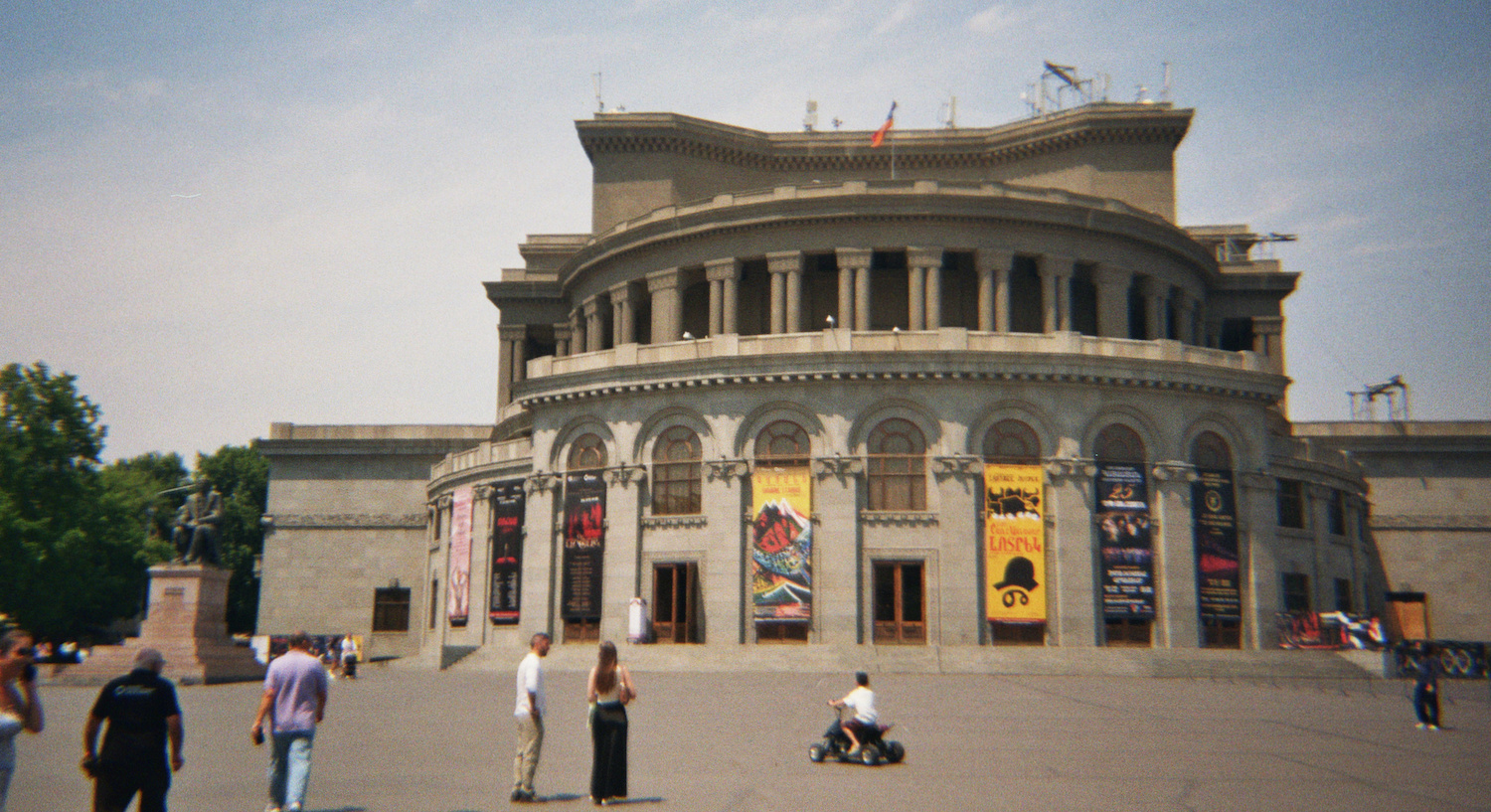
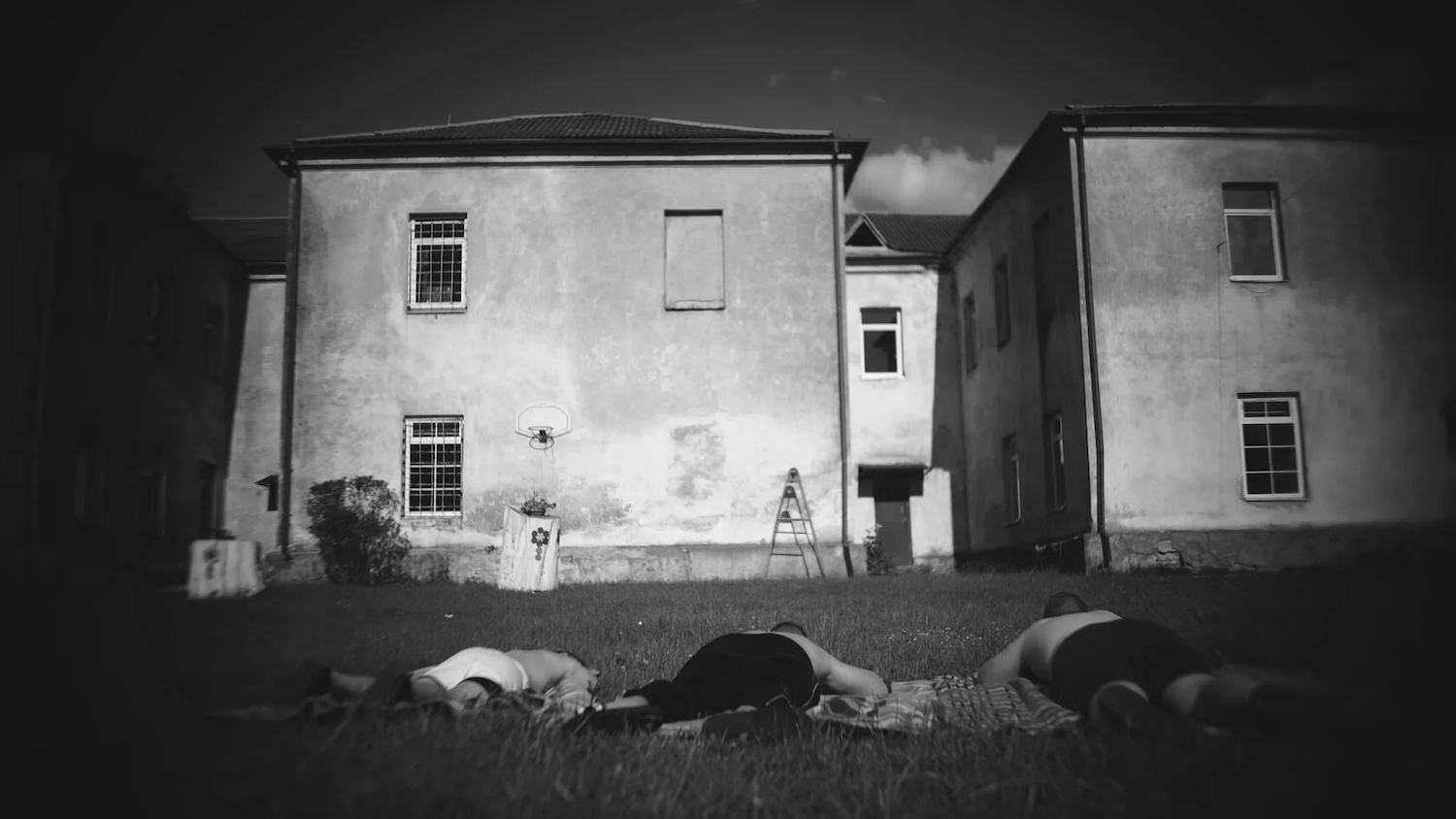
Youth in Statis
Like yesterday’s Orbita (Yervand Vardanyan, 2024), International Competition entry Bogdanas Longs To Stay (Marat Sargsyan, 2023, above) stays almost entirely within the walls of a single institution, trading a disused factory for a juvenile offenders facility. An observational documentary that sympathetically captures the rough-and-tumble nature of young masculinity on the outer edges of contemporary Lithuanian life, it draws its strength from Sargsyan’s unique visual acuity.
The entire film is black-and-white, with a super anamorphic lens that distorts the edges of the screen, giving it a dreamlike and off-kilter aesthetic. Within a limited space, Sargsysan has a touch for epic perspectives, the boys shot from below, shirts off, working hard at tasks or simply playing around. One shot in particular, with the heat almost shimmering onto the frame and the water creating a hazy effect, creates an intense feeling of nostalgia for youth, both its possibilities and its innocence — even if these boys have grown up quicker than their contemporaries.
As the summer approaches, the eponymous Bogdanas, larger than the others and arguably more empathetic, is unable to picture life away from the facility. It’s not that he has had it particularly worse than the other lads, but he appears more sensitive to the pressures of the future, enjoying the cocoon of living in a structured way. Outside, it appears, lies chaos.
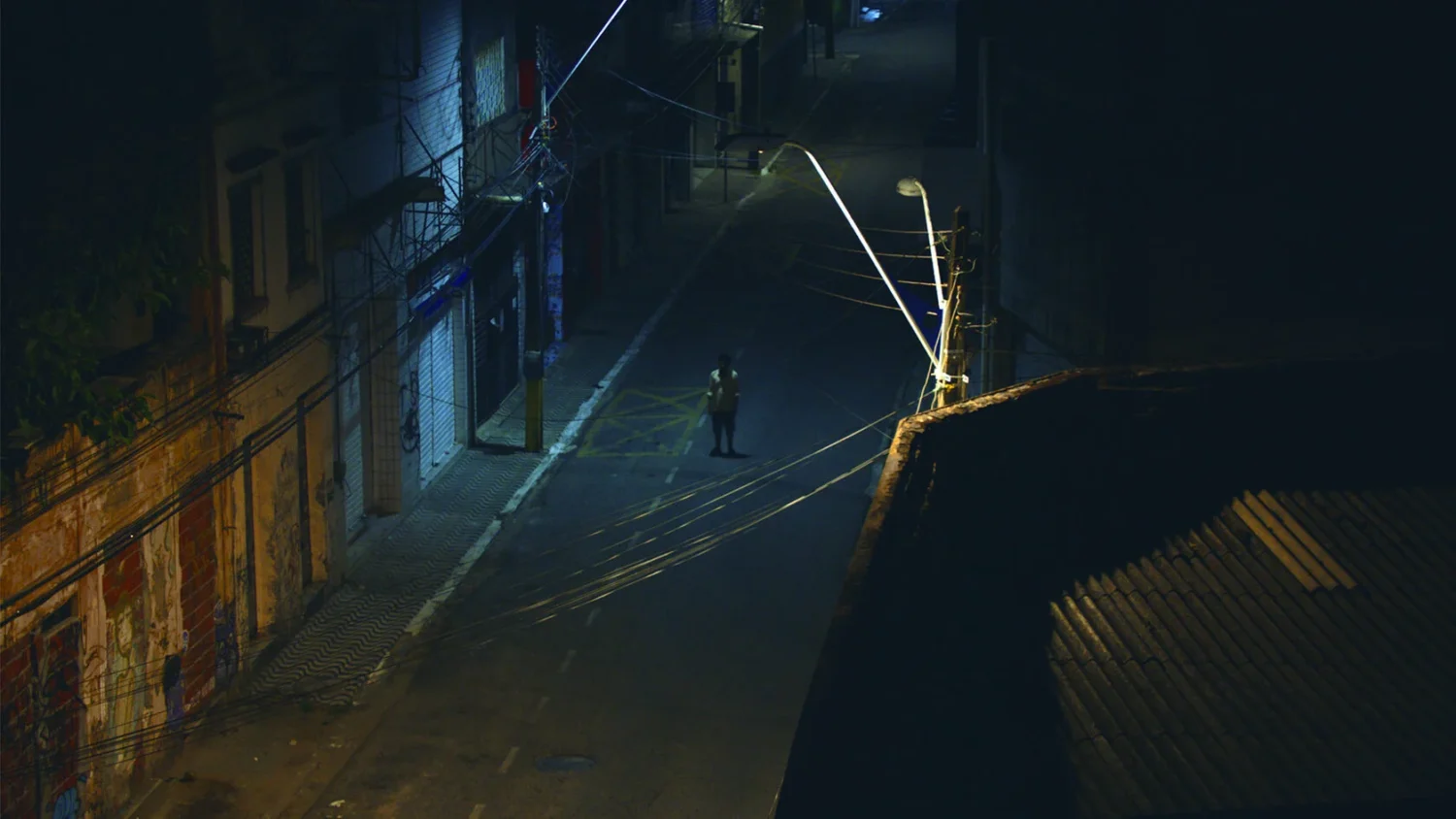
Lockdown Surrealism
While the eponymous Bogdanas doesn’t want to leave the juvenile facility, David (Lucas Limeira) is forced to stay longer than intended in Fortaleza, Brazil, as a result of the coronavirus pandemic. Attending from Portugal for a delayed, potentially cancelled, film festival, his extended time back home forces him to come to terms with his complicated relationship with his father.
Another addition to the growing canon of lockdown movies, A Strange Path (Guto Parentes, 2023, also in the International Competition) rises quickly near the top of the fray due to its ability to move beyond recycled tropes (everything closing, disinfection, masks) into a far more surrealist aesthetic, sneaking in a more touching, oddball tale of grief within an already well-worn pandemic setting.
David is an experimental horror filmmaker, the strange, Giallo-like vibes of his independent works bleeding into the surrealist aspects of Parentes’ film, replete with unnerving zooms, sudden inserts and a general feeling of creeping dread. There are also various moments of deadpan comedy, including David’s increasing frustration with the vagaries of pandemic restrictions and the slowness of the authorities to make a meaningful difference. Some dream sequences don’t work so well, but the final rug pull is quietly effective, foregoing logical sense for pure emotional resonance.
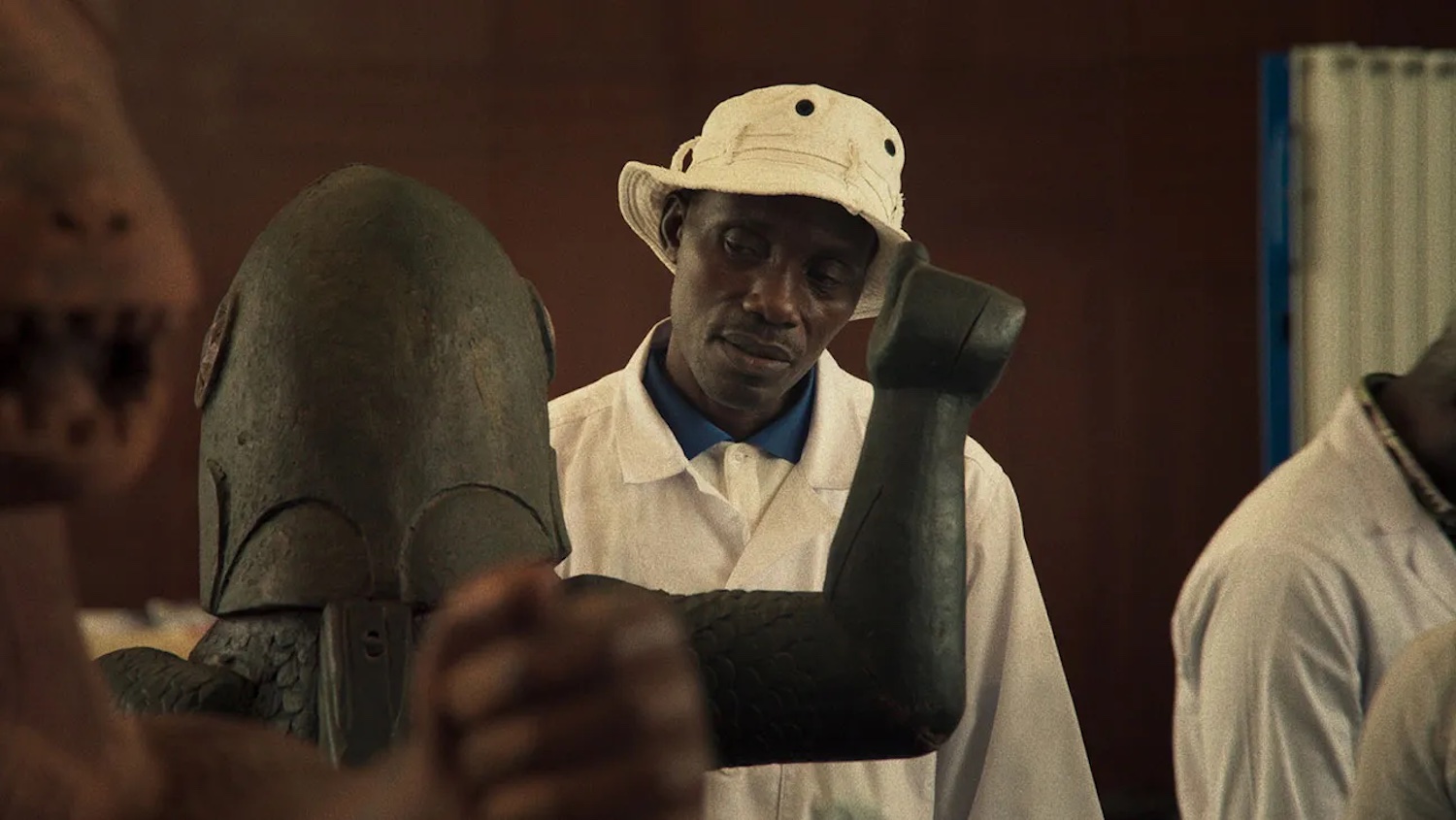
A Triumphant(?) Return
Having missed non-comp entry Dahomey (Mati Diop, 2024) at Berlinale, thus guaranteeing its Golden Bear status, I was keen to catch up on the Senegalese director’s fêted follow-up to Atlantics (2019), cutting short an (Ararat) brandy tasting at the Grand Hotel to rush to a screening with French Ambassador Olivier Decottignies in attendance.
His appearance highlights the political and bridge-building nature of film festivals, as well as the special nature of the Armenian-French relationship — potently stressed by the Charles Aznavour Maison located right at the top of the Cascade as well as his own dedicated square just outside the Moscow Kino.
But the French-Senegal-Benin production Dahomey doesn’t let La République off the hook quite so easily, using the return of 26 stolen artefacts to Benin as a springboard to investigate the deteriorating effects of colonialism and the importance of African nations taking control of their own stories.
With the perspective of five months since the Berlinale, I’m not sure it’s a worthy competition winner. Competition contemporary Pepe (Nelson Carlos De Los Santos Arias, 2024) had a similar idea of stolen African heritage and guttural-sounding anthropomorphic narration, but it was far more visually arresting in the process.
Where Dahomey sings is in the Beninese town hall following the return of these artefacts, giving the local people a chance to discuss the importance of their symbols; debating everything from the loss of their heritage, to French tokenistic gestures, to speaking in the language of their former oppressors. Seeing these people discuss their art, their culture and their society on their terms, with Diop standing back, is one of the cinematic highlights of the year. I would easily have watched the whole thing.
Redmond is the editor-in-chief of Journey Into Cinema.
